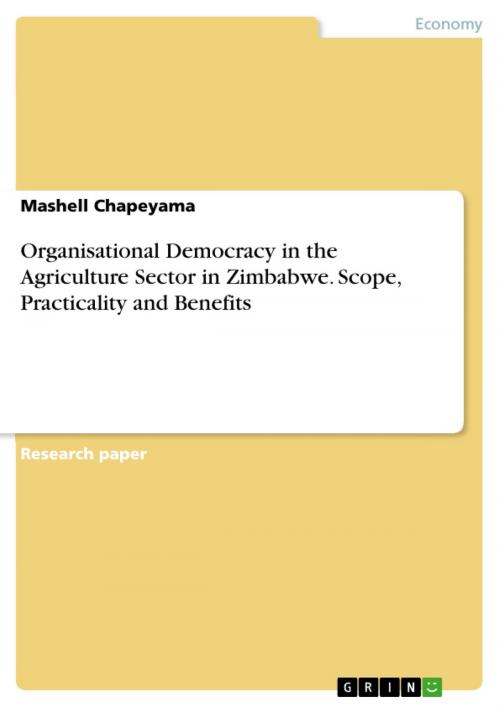Organisational Democracy in the Agriculture Sector in Zimbabwe. Scope, Practicality and Benefits
Business & Finance, Human Resources & Personnel Management| Author: | Mashell Chapeyama | ISBN: | 9783656290148 |
| Publisher: | GRIN Verlag | Publication: | October 16, 2012 |
| Imprint: | GRIN Verlag | Language: | English |
| Author: | Mashell Chapeyama |
| ISBN: | 9783656290148 |
| Publisher: | GRIN Verlag |
| Publication: | October 16, 2012 |
| Imprint: | GRIN Verlag |
| Language: | English |
Research Paper (undergraduate) from the year 2012 in the subject Business economics - Personnel and Organisation, grade: none, Atlantic International University (School of Social and Human Studies), course: Masters in Human resources Management, language: English, abstract: Orientation: this study is a critical analysis on the role of organizational democracy in the function, effectiveness and productivity of an organization. Research Purpose: the purpose of this study was to investigate the relationship that exists between organizational democracy and productivity as well as to identify the potential of organizational democracy in Zimbabwe. Motivation of the study: A scientific inquiry is vital to assess the role organizational democracy can play in enhancing organizational vitality, productivity and cohesion. From such a study the practicality of organizational democracy can be assessed and a frame work can be proposed through which employees participate in organizational structures and systems. Research Design, approach and Method: A quantitative survey comprising group interviews and questionnaire was carried out. Ninety participants from nine agricultural companies in the Chipinge District of Zimbabwe took part in the research. The response rate for the questionnaire was 84%. . Main Findings: Organizational democracy is positively related to productivity. There is no universal standard of industrial democracy, but its nature depends on the current socioeconomic and political environment in which the organization exists. An organization can also evolve from one democratic structure to another in response to the changing environment. Practical/Managerial implications: the form democracy takes must come as a result of dialogue and consultation with employees and stakeholders. Understanding the environment in which the organization exists would provide vital input to the nature of employee participation in the decision making process. Contribution/value-added: the study showed that consultation, consent, dialogue and mutuality are important ingredients in the nature of organizational democracy and they influence the resultant benefits.
Research Paper (undergraduate) from the year 2012 in the subject Business economics - Personnel and Organisation, grade: none, Atlantic International University (School of Social and Human Studies), course: Masters in Human resources Management, language: English, abstract: Orientation: this study is a critical analysis on the role of organizational democracy in the function, effectiveness and productivity of an organization. Research Purpose: the purpose of this study was to investigate the relationship that exists between organizational democracy and productivity as well as to identify the potential of organizational democracy in Zimbabwe. Motivation of the study: A scientific inquiry is vital to assess the role organizational democracy can play in enhancing organizational vitality, productivity and cohesion. From such a study the practicality of organizational democracy can be assessed and a frame work can be proposed through which employees participate in organizational structures and systems. Research Design, approach and Method: A quantitative survey comprising group interviews and questionnaire was carried out. Ninety participants from nine agricultural companies in the Chipinge District of Zimbabwe took part in the research. The response rate for the questionnaire was 84%. . Main Findings: Organizational democracy is positively related to productivity. There is no universal standard of industrial democracy, but its nature depends on the current socioeconomic and political environment in which the organization exists. An organization can also evolve from one democratic structure to another in response to the changing environment. Practical/Managerial implications: the form democracy takes must come as a result of dialogue and consultation with employees and stakeholders. Understanding the environment in which the organization exists would provide vital input to the nature of employee participation in the decision making process. Contribution/value-added: the study showed that consultation, consent, dialogue and mutuality are important ingredients in the nature of organizational democracy and they influence the resultant benefits.















